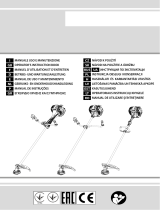
23
GB
To clean lter proceed as follows: remove it from
fuel lling hole. Replace it (Fig. 10) if too dirty.
ENGINE
Clean cylinder ns with a brush or compressed
air periodically. Dangerous overheating of engine
may occur due to impurities on the cylinder.
SPARK PLUG
Clean spark plug and check electrode distance
periodically (Fig. 12). Use Champion NGK CMR7H
or of other brand with the same thermal grade.
ATTACHMENTS COUPLING
To ensure constant and correct operation of the
tool, every 30 hours of operation remove the
attachment (D, Fig. 4), grease the drive shaft
inside the coupling (E, Fig. 4) and the drive shaft
at the end of the attachment (D, Fig. 4). Use
high quality molybdenum disulphide grease.
Always grease the coupling whenever you
change the attachment.
CARBURETOR
Before adjusting the carburetor, clean the air lter
(C, Fig. 11) and warm up the engine. This engine
is designed and manufactured in order to comply
with the applicable (EU) 2016/1628 Regulations.
The carburetor (Fig. 9) is designed to permit
only the adjustement of L and H screws in a
range of 1/4; the quarter round the hall range
admissible for L and H ± 1/8 screws is determined
by the manufacturer and you can not modify it.
WARNING: Don’t try to force the screws
outside the range!
Idle screw T is adjusted in order to ensure a good
safety margin between idle running and clutch
engagement.
Screw L must be adjusted so that the engine
promptly responds to sharp accelerations and
gives good idle operation.
Screw H must be adjusted so that the engine gives
maximum power during the cutting phase.
WARNING: With the engine idling (2800-
3000 rpm), the blade should not rotate. We
recommend that you have your nearest
authorised dealer or service workshop carry
out any carburettor adjustments.
WARNING: Weather conditions and
altitude may aect carburation.
EMISSIONS COMPLIANCE
This engine, including the emissions control
system, must be operated, used and maintained
in accordance with the instructions provided in the
user’s manual in order to maintain the emissions
performance within the legal requirements
applicable to non-road mobile machinery.
No deliberate tampering with or misuse of the
engine emissions control system has to take place.
Incorrect operation, use or maintenance of the
engine or of the non-road mobile machinery
could result in possible malfunctions of the
emissions control system to a point where the
legal requirements applicable are not respected
; in such case a prompt action must be taken in
order to rectify the system’s malfunctions and
restore the applicable requirements.
Examples, not exhaustive, of incorrect operation,
use or maintenance are:
- Forcing or breaking the devices for metering
the fuel;
- Use of fuel and/or engine oil not fullling the
characteristics shown in the chapter STARTER
/ FUELING;
- Use of not original spare parts, for example
spark plug, etc. ;
- Missing or improper maintenance of the
exhaust system, including incorrect timing of
maintenance for muer, spark plug, air lter, etc.
WARNING – Tampering with this engine
makes the EU emissions certication no more
valid .
The level of CO2 of this engine can be found in
the Emak’s website (www.myemak.com) under
section “The Outdoor Power Equipment World”.
AIR FILTER
Every 8-10 working hours, remove the cover (A,
Fig. 11), clean the lter (C).
Clean with Emak degreaser p/n 001101009A, rinse
with water and blast dry with compressed air, not
too close, blowing from the inside outwards.
Replace if dirty or damaged. The engine runs
irregularly if the lter is clogged, with consequent
higher consumption and lower performance.
FUEL TANK
Check fuel lter periodically. A dirty lter can cause
dicult starting and lower engine performance.



















